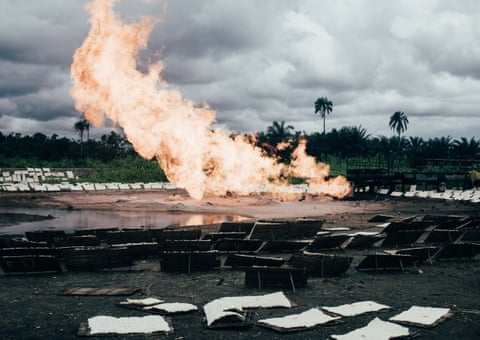Covering 70,000 sq km (27,000 sq miles) of wetlands, the Niger delta was formed primarily by sediment deposition. It is home to more than 30 million people and 40 different ethnic groups, making up 7.5% of Nigeria’s total land mass.

Crude oil Bunker in Bodo, Niger delta, Nigeria.
It used to be an incredibly rich ecosystem that contained one of the highest concentrations of biodiversity on the planet before the oil industry moved to the area.
A palm fruit collector in Luekue community in Nyokhana. Right, Reuben, a police officer in Luekue who escorted us through Ogoni land, where we visited the polluted areas and the communities who inhabit them.

A small artisanal gin distillery in Luekue community in Nyokhana. Petrol refineries use the same technology as the distilleries in the bush.
The Nigerian petroleum resources department estimated 1.89m barrels were spilled into the Niger delta between 1976 and 1996. A United Nations development programme report states there have been a total of 6,817 spills between 1976 and 2001, which account for a loss of 3m barrels of oil.
So far, no real action has been taken by the authorities and oil companies to clean up and renaturalise the delta, and oil spills are still very common. Half of them are caused by pipeline and tanker accidents, while other causes include sabotage (28%) and oil production operations (21%), with 1% of the spills being accounted for by inadequate production equipment.

Makoko village, Lagos state, Nigeria.


Residents of Makoko village, outside Lagos. Makoko residents buy low quality kerosene for their generators.
As a result of the oilfields’ small size, there is an extensive network of above-ground pipelines and flow line between the fields, which allow many opportunities for leaks. Pipelines have an estimated life-span of about 15 years, but many of the ones in the Niger delta have been there for 20 to 25 years.


Polluted soil in Bodo land, Niger delta, Nigeria. Right, a destroyed oil tank in Bodo, in the Delta state.


A burnt police car in Ijegun, Lagos state. Right, a plastic canister near an artisanal refinery, in Luekue in Nyokhana, Khana.
Another issue in the Niger delta is natural gas flaring. Nigeria flares more natural gas associated with oil extraction than any other country, with estimates suggesting that about 70% of associated gas produced in the country is wasted through flaring, the equivalent of 25% of the UK total natural gas consumption.
Ese Awolowo and her mother at a natural gas flaring site in Ughelli.
Ese Awolowo and her mother often go to a natural gas flaring site in Ughelli to dry crops that they sell at the market.
Samson, a dancer, who is part of a local artist community in Bariga, and his neighbour Joy.
I photographed Samson when he was performing. From time to time he and some of his friends organise parties and performances in their local area and beyond. Their masked acts are a mixture of art, entertainment and political action. Joy is the neighbour of one of the group members.

A local police man in Ughelli, Niger delta, Nigeria.
During my trip through the delta, on some occasions we were escorted by local police officers because of the danger of attacks by gangs. In Ughelli, an officer escorted us when we visited people affected by gas flaring.
When we got in contact with people suspected of illegal activity, our producer asked some of his friends to join our ranks to have backup in case the situation turned nasty.
Although gas flaring is discouraged because of its toxicity and contribution to the climate emergency, separating commercially viable associated gas from oil is costly. Therefore, oil companies have been burning off associated gas since oil extraction started in Nigeria in the 1960s.

Gas flaring site in Ughelli, Niger delta, Nigeria.
Gas flaring releases large amounts of methane – which has a high global heating potential – together with carbon dioxide and other greenhouse gas. While flaring in the west has been minimised, in Nigeria it has grown proportionally with oil production.

The crew of the ship are suspected to be smuggling oil. The Nigerian police has seized their boat in the Gulf of Guinea and is holding them on ship arrest.

One of the community elders who showed me around the polluted areas in B-Dere.

Wahala is part of the artistic research project The Great Report by Moritz Frischkorn, which will premiere as a performance-exhibition at Kampnagel, Germany in January 2020. Based on the observation that logistics companies sometimes call themselves “choreographers”, the project unfolds how global supply chains create links between distant publics while reproducing neocolonial inequalities.
The Great Report is funded by the ministry of culture and media in Hamburg, the Institut für Auslandsbeziehungen, the Hamburgische Kulturstiftung, and is co-produced by Kampnagel, Hamburg.
